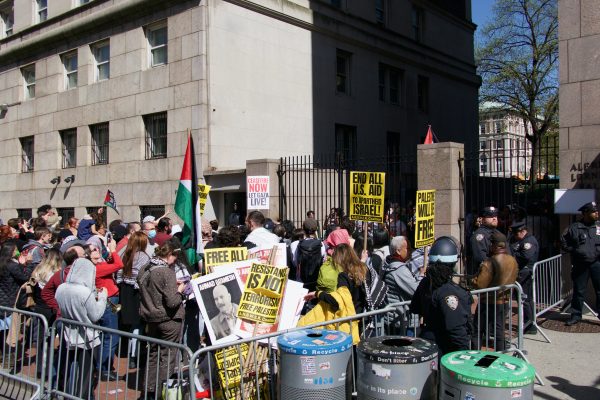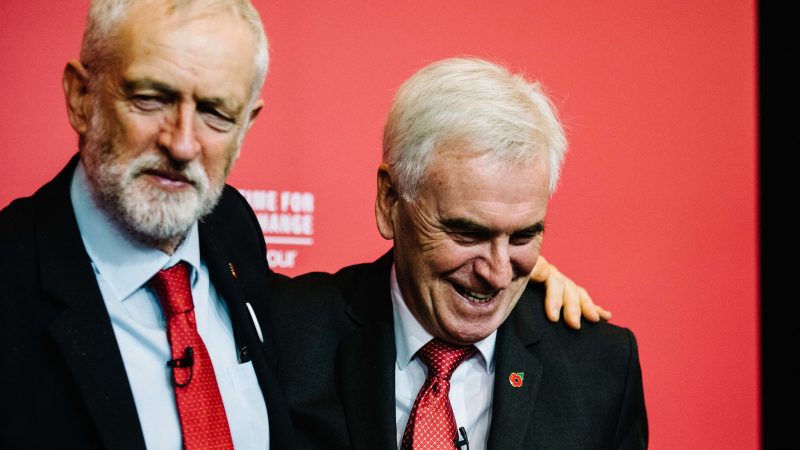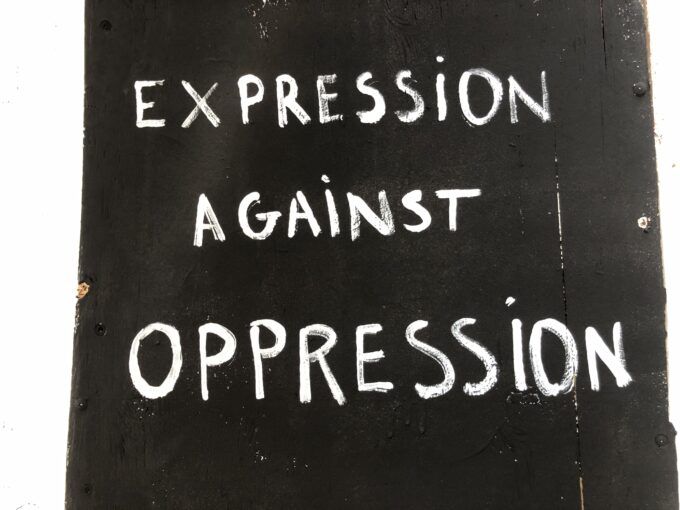Pro-Palestine student protesters are being smeared as puppets of shadowy “outside agitators.” The presence of community members and experienced activists in the protests is nothing to be ashamed of: we need outside agitators to build a better world.

Protests in and around Columbia University in support of Palestine and against Israeli occupation. A side gate by the bookstore where the crowd is—inside and out (Wikimedia Commons)
These days, outside agitators are everywhere. According to politicians, police commissioners, university administrators, and mainstream journalists they lurk on every campus where there has been resistance to the unfolding genocide in Gaza, especially at the solidarity encampments. Emory University president Gregory Fenves complained that “highly organized, outside protesters” were behind the school’s pro-peace demonstrations. The University of Texas at Austin followed suit, releasing a statement expressing “concern that much of the disruption on campus over the past week has been orchestrated by people from outside the University, including groups with ties to escalating protests at other universities around the country.” In a story that ran under the headline “Professional protestors of Texas unmasked,” the Daily Mail salaciously reported that the infiltrators included an elementary school teacher, a Palestinian shopkeeper, an interpreter, and a costume designer.
No one has sounded the alarm louder than New York City’s compulsive liar mayor, Eric Adams, who has complained that “outside agitators” are out to “radicalize our children” — the implication being that young people would be quiescent in the face of mass starvation and bombardment if not for some nefarious external influence. Recently, the city released data that purportedly bolstered his claims: approximately a third of the people arrested during protests at Columbia University and 60 percent of those arrested at City College of New York were not “affiliated” with those schools.
Encampment sympathizers understandably responded to these accusations by arguing that allegedly “unaffiliated” outsiders are, more often than not, actually insiders of a kind. Progressive journalists and online commentators have highlighted how students from other schools, alumni, community members, curious onlookers, veteran activists, and the like all have legitimate ties to local campuses, and thus their presence hardly merits concern, let alone panic (particularly at City College, which is only one of twenty-five colleges in the City University of New York system, and students of the other twenty-four schools could be included in the city’s number of allegedly unaffiliated arrestees).
Without a doubt, there’s truth to such retorts. But they also risk playing into the hands of our opponents. To affirm that the majority of protesters are “insiders” as opposed to “outsiders” only aids those who want to create fissures and foment distrust in order to divide and conquer our movements. It’s a way of denying the rights of activists to share lessons, learn from movement elders, and collaborate across communities — in other words, to properly and effectively organize.
The “outside agitator” charge is a way to isolate individuals and create social separation, when the reality is that injustice of any kind, but especially war, necessarily concerns us all. On the issue of genocide, there should be no outside.
Nobody Is Outside Solidarity
Of course, outsiders of a certain ilk can occasionally be destructive. They might be real infiltrators (e.g., undercover cops or federal agents) or people acting in bad faith and looking to hijack a cause for their own purposes. But these aren’t the outsiders that we are being instructed to worry about by today’s pundits.
Consider the Wall Street Journal’s reporting on the fact that some Columbia students had consulted veterans of the Black Panther Party, as though this were scandalous. The fact that protesters share knowledge and expertise with each other or seek out the wisdom of their elders is galling to the authorities, who respond by painting the demonstrations as not only overrun by outsiders but also corrupted by “paid” activists or “chaos professionals.”
The New York Times beat this drum when it ran not one but two articles discussing “professional agitator” Lisa Fithian, the legendary nonviolent direct action trainer, who was filmed outside Columbia’s Hamilton Hall as it was being occupied. Fithian was there providing nonviolent direct action training to the students, as she has done for activists from a range of movements going back decades.
Why are outside agitators so threatening to the powers that be? The answer is that outsiders are a special kind of solidarity builder, even when they remain at a distance and lack any particularly useful skills or insights. Anyone who has been part of a movement knows how much displays of solidarity matter.
For example, we will never forget the hundreds of pizzas people from across the country purchased and delivered to the Occupy Wall Street encampment, each box a reminder that someone, somewhere believed the uprising mattered. Something similar happened in 2014 when Palestinian activists advised Black Lives Matters protesters in Ferguson, Missouri, on how to cope with state violence (“Always make sure to run against the wind / to keep calm when you’re teargassed, the pain will pass, don’t rub your eyes! #Ferguson Solidarity”). Being buoyed by people you don’t know is emboldening and galvanizing, and helps weave local acts of resistance into larger, more powerful narratives and coalitions.
This is something to celebrate, not shy away from. Outside agitators are a necessary part of progressive social transformation. People supporting and joining far-flung movements, acting responsibly and with a good dose of humility, is a wonderful thing — as is younger organizers learning from people who have more experience.
As we detail in Solidarity: The Past, Present, and Future of a World-Changing Idea, outside agitators have always played a pivotal role in struggles for a more just world. Historically, solidarity has been sabotaged by elites who sow division to maintain their power, including by splintering and segregating people spatially and socially. A lack of regular social contact across differences inhibits solidarity in obvious ways: physical separation abets psychological separation. And yet solidarity can also thrive as a result of the perspective distance brings. This is particularly true when divides are intentionally breached.
Over the centuries, committed outsiders have advanced the cause of solidarity, often at great personal risk, overcoming social barriers and expanding people’s conception of the “us” to which they belong. Roaming visionaries and organizers have served as bridges, uniting far-flung individuals and communities.
In nineteenth-century Britain, itinerant activists promoted Chartist principles, building a national movement that demanded basic democratic rights. In the United States, abolitionists, including Frederick Douglass, traveled far and wide promoting a vision of a multiracial society to all who would listen. “Wobblies,” as Industrial Workers of the World organizers were called, hopped freight trains to lend a hand to working people in remote regions, aiming to organize them into one big union. Civil rights Freedom Riders rode buses across state lines, visiting towns across the South to encourage people to challenge Jim Crow and register to vote.
In every instance, the powerful have insisted that, without such meddling by strangers, local people would have remained complacent and content — or, in Eric Adams’s terminology, the children would not be radicalized.
Adams’s hostility echoes a long-standing reactionary refrain. In the twentieth century’s early decades, anarchism and socialism were portrayed as dangerous imports from Eastern and Southern Europe. As Red Scare tactics evolved, movements for peace, labor rights, and racial equality were figured as Soviet plots. Simply holding left-wing ideas made one a subversive, un-American presence — an “outside agitator” subject to forcible separation and removal. The first Red Scare and then McCarthyism trampled basic liberal tenets as a political witch hunt sought to identify and expel radicals. Tens of thousands of people, both foreign and native-born, were threatened with or subjected to imprisonment, deportation, job loss, blacklisting, and sometimes worse.
Along with new laws and institutions to root out “subversives,” Cold War conspiracism painted every progressive ambition, no matter how milquetoast, as alien and unacceptable. Representative John Rankin of Mississippi denounced the civil rights movement as “communistic bunk” — as though black people could not demand equality and liberation without a prompt from the Soviets. The notoriously bigoted Alabama governor George Wallace took a similar tack when civil rights organizers decamped for his state. In 1965, he signed a resolution calling on loyal residents of every “race, color, and creed” to stay home and not participate in “continued agitation and demonstrations, led and directed by outsiders” aiming to “foment local disorder and strife among our citizens.”
The demonstrations in question had intensified after a state trooper killed a twenty-six-year-old activist named Jimmie Lee Jackson and included the now-famous series of marches from Selma to Montgomery that culminated in “Bloody Sunday,” when police attacked protesters with tear gas and truncheons. The resolution implied that local people did not support the protests, which was not true. Yet the fact that some of the activists were outsiders was undeniable: rather than discrediting the demonstrations, the presence of non-Alabamans and non-Southerners spoke to the ways the movement had built effective, and powerful, solidarity. The presence of Communists was undeniable as well, and though Wallace and his ilk made it seem unthinkable, homegrown Communists, born and raised in the American South, had been some of the boldest anti-racist organizers since the 1930s.
In the decades that followed, the phrase “outside agitator” came into common usage as a way to smear the civil rights movement. But outsiders were crucial to the fight.
For example, as part of the Student Nonviolent Coordinating Committee (SNCC), young people from across the country, many of whom had experience supporting sit-ins at segregated lunch counters, set up shop in rural Southern towns, where they registered residents to vote — a dangerous task given the constant threat of vigilantism and police violence. As sociologist Francesca Polletta shows in an analysis of their efforts, these young people brought more than courage and organizing know-how. They also brought a sense of connection to the wider world that punctured locals’ sense of isolation and vulnerability. The presence of activists from other parts of the country was a visceral sign that local people were not alone in their struggle against white supremacy.
As a result, new self-conceptions, associations, and possibilities emerged. SNCC youth “created obligations to a movement with which residents had little contact, and they created obligation to a nation whose promises lay, always, in the distant future.” Linked to the broader movement, locals were emboldened and empowered; their “we” was widened thanks to the presence of outsiders.
As Polletta details, outsiders have various attributes that can make them effective cultivators of solidarity and catalysts for change. Being removed from the social and familial commitments and petty conflicts and rivalries that characterize daily life can help activists open space for people to see themselves and engage in new ways. While some scholars of social change emphasize the importance of deep bonds and a sense of collective identity, Polletta points out that what she calls “dense ties” and a “mobilizing identity” can be at odds with each other.
“Participating in disruptive action requires seeing oneself as different than one was. And that is difficult to do, perhaps most difficult to do, in our closest relationships,” she explains. “Our families and friends want us to be the person we were. This is surely the case when they know that participating will jeopardize our safety, and, for the families and friends of black people in the Deep South, their safety as well.”
Agitators for Racial Justice
Today the term “outside agitator” remains a potent insult, one regularly lobbed at anyone seeking to bend the moral arc of the universe toward justice. In 2020, when millions of people took to the streets in grief and outrage over the murder of George Floyd in Minneapolis, political leaders dusted off the old bromide.
“Groups of outside radicals and agitators are exploiting the situation to pursue their own separate and violent agenda,” Attorney General Bill Barr said in a statement, conjuring shadowy anarchist evildoers. As is the case today, it wasn’t just Republicans who cast aspersions.
“They are coming in largely from outside of the city, from outside of the region, to prey on everything we have built over the last several decades,” Democratic Minneapolis mayor Jacob Frey declared. The state’s Democratic governor, Tim Walz, gave a “best estimate” that 80 percent of the rioters had arrived from out of town.
Patently absurd, both assertions would quickly be walked back. USA Today did an analysis of protesters’ social media data and arrest records and found the overwhelming majority of them were, in fact, from the region. As for those other 20 percent, good for them. In the immortal words of Bernie Sanders, they traveled to fight for someone they did not know.
That’s what Martin Luther King Jr did before he was assassinated for trying to build a multiracial working-class movement that could effectively challenge the evils of poverty, racism, and war — the same problems we must tackle and overcome today.
King, too, was reviled as an outside agitator as he traveled to the front lines of the struggle for racial and economic equality. It was a charge he reflected on in his celebrated “Letter from a Birmingham Jail” composed in 1963, offering words of wisdom that can still guide us.
“I am cognizant of the interrelatedness of all communities and states. I cannot sit idly by in Atlanta and not be concerned about what happens in Birmingham. Injustice anywhere is a threat to justice everywhere,” King mused. “We are caught in an inescapable network of mutuality, tied in a single garment of destiny. Whatever affects one directly, affects all indirectly. Never again can we afford to live with the narrow, provincial ‘outside agitator’ idea. Anyone who lives inside the United States can never be considered an outsider anywhere within its bounds.”





